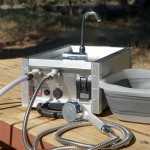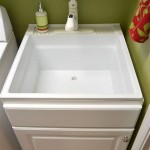The Enduring Appeal of the Cast Iron Farmhouse Kitchen Sink
The farmhouse kitchen sink, also known as an apron-front sink, has experienced a resurgence in popularity, becoming a sought-after feature in both modern and traditional kitchen designs. Among the various materials available, cast iron stands out as a durable and aesthetically pleasing choice. This article explores the characteristics, benefits, and considerations associated with cast iron farmhouse kitchen sinks, providing a comprehensive overview for individuals considering this option for their kitchen renovation or construction projects.
Cast iron sinks are not a new invention. They have been a staple in kitchens for generations, prized for their robustness and heat retention. The manufacturing process involves pouring molten iron into a mold, which then cools and solidifies. This creates a dense, heavy base. The cast iron core is then typically coated with a thick layer of enamel, providing a smooth, non-porous surface that is resistant to stains and chipping, though not impervious. This enamel coating is what contributes to the sink's color and overall aesthetic appeal.
The farmhouse design adds a distinct visual element. The defining feature of a farmhouse sink is its exposed front, or apron. This apron extends slightly beyond the cabinet face, creating a focal point in the kitchen. This design element not only offers a classic and charming aesthetic but also provides a functional benefit: it allows the user to stand closer to the sink, reducing strain on the back and arms during extended use. The depth of farmhouse sinks often exceeds that of standard sinks, offering ample space for washing large pots and pans.
Durability and Longevity
One of the primary advantages of cast iron farmhouse sinks is their exceptional durability. The inherent strength of cast iron allows the sink to withstand heavy use and resist dents and warping. When properly cared for, a cast iron sink can last for decades, making it a worthwhile investment for homeowners seeking a long-lasting fixture. The enamel coating, while susceptible to chipping under extreme impact, is generally resistant to scratches and stains caused by everyday use. Minor scratches can often be buffed out with specialized cleaning products designed for enamel surfaces. The weight of the sink is significant, which contributes to its stability but also necessitates strong cabinet support.
The composition of the enamel coating plays a crucial role in the sink's durability. Higher-quality enamel coatings are fired at higher temperatures, resulting in a harder and more resilient surface. While less expensive cast iron sinks may utilize thinner or less durable enamel coatings, opting for a product from a reputable manufacturer with a proven track record is crucial for ensuring longevity. Inspecting the sink carefully upon delivery for any existing imperfections in the enamel is also recommended.
Proper maintenance is essential for preserving the integrity of a cast iron farmhouse sink. Abrasive cleaners should be avoided, as they can scratch the enamel surface. Instead, mild detergents and non-abrasive sponges or cloths are recommended for daily cleaning. Stubborn stains can often be removed with a paste made of baking soda and water. Promptly addressing any chips or scratches in the enamel is important to prevent rust from forming on the exposed cast iron. Repair kits are available that can be used to touch up minor damage and maintain the sink's appearance.
Aesthetic Versatility and Design Options
Beyond their durability, cast iron farmhouse sinks offer a wide range of aesthetic options, allowing homeowners to seamlessly integrate them into various kitchen styles. The classic white enamel finish remains a popular choice, offering a clean and timeless look that complements both traditional and modern designs. However, cast iron sinks are also available in a variety of colors, ranging from neutral tones to bold hues, providing greater design flexibility. The availability of different finishes, such as matte or glossy, further enhances the customization possibilities.
The shape and size of the farmhouse sink can also be tailored to suit specific kitchen layouts and design preferences. Single-bowl sinks offer a spacious washing area, while double-bowl sinks provide separate compartments for washing and rinsing. The depth of the sink is another consideration, with deeper sinks being better suited for handling large pots and pans. Some manufacturers also offer farmhouse sinks with integrated drainboards or cutting boards, adding functionality and convenience.
The choice of faucet and hardware can further enhance the overall aesthetic of the cast iron farmhouse sink. Traditional bridge faucets with porcelain handles complement the classic farmhouse style, while sleek and modern faucets add a contemporary touch. The finish of the faucet and hardware should coordinate with the color of the sink and other kitchen elements to create a cohesive design. Attention to detail in these finishing touches can elevate the overall look of the kitchen and enhance the appeal of the cast iron farmhouse sink.
Installation and Maintenance Considerations
Installing a cast iron farmhouse sink requires careful planning and execution due to its considerable weight. The sink typically sits directly on the base cabinet, and the cabinet must be strong enough to support the weight of the sink when it is filled with water. Reinforcing the cabinet with additional supports may be necessary, particularly for larger and heavier sinks. Precise measurements are crucial to ensure a proper fit and prevent leaks. Professional installation is generally recommended, especially for individuals who are not experienced in plumbing and carpentry.
The apron-front design of the farmhouse sink also requires careful consideration during cabinet selection. Standard base cabinets may not be compatible with a farmhouse sink, as the apron typically extends beyond the cabinet face. Specialized farmhouse sink base cabinets are available, which are designed to accommodate the apron and provide the necessary support. These cabinets often feature a recessed front panel or a cutout that allows the apron to fit snugly against the cabinet.
Maintaining the clean and pristine appearance of a cast iron farmhouse sink requires regular cleaning and care. As mentioned previously, abrasive cleaners should be avoided, as they can damage the enamel surface. Promptly cleaning up spills and food residue is important to prevent staining. Hard water can leave mineral deposits on the sink, which can be removed with a solution of vinegar and water. Drying the sink after each use can help prevent water spots and maintain its shine. Investing in a sink grid can also protect the bottom of the sink from scratches and dents caused by pots and pans.
The weight of cast iron sinks also means additional considerations for plumbing. The drain lines need to be able to handle the capacity of the basin. Professional plumbers can advise on the appropriate pipe sizes and layouts to ensure proper drainage and prevent clogs. Consideration should also be given to the placement of the garbage disposal, if one is being installed. The added weight of the disposal can further stress the sink's support structure, so adequate bracing is crucial.
Ultimately, a cast iron farmhouse kitchen sink offers a compelling combination of durability, aesthetic appeal, and functionality. By carefully considering the factors outlined above, homeowners can make an informed decision and select a sink that will enhance the beauty and value of their kitchen for years to come. The timeless design and robust construction of cast iron ensure that it remains a popular choice for those seeking a durable and stylish kitchen centerpiece.

Reviews For Kohler Elmbrook Cast Iron 33 In Single Bowl Farmhouse Apron Front Kitchen Sink White Pg 1 The Home

Kohler Pepin Farmhouse Apron Front 33 In X 18 25 Biscuit Cast Iron Single Bowl Kitchen Sink R26103 96 At Com

47 Inch Cast Iron High Back Double Bowl Farmhouse Kitchen Sink

Kohler Farmhouse Apron Front Kitchen Sink 33 X28 Enameled Cast Iron Gloss White 885612232694

The Kitchen Sink A Primer Duncan S Creative Kitchens

Historic Houseparts Inc Antique Kitchen Sinks 52 American Standard White Cast Iron Enameled Farmhouse Sink With Left Drainboard And Backsplash Circa 1920

Why Choose Cast Iron Sinks Ceco

36 Inch Cast Iron High Back Farm Sink

Kohler Dickinson 19 56 In Undermount Single Bowl White Cast Iron Kitchen Sink 6546 0 The Home

American Standard Delancey Farmhouse Apron Front 22 06 In X 36 Brilliant White Cast Iron Double Equal Bowl 4 Hole Kitchen Sink 77db36220a 308 At Com







